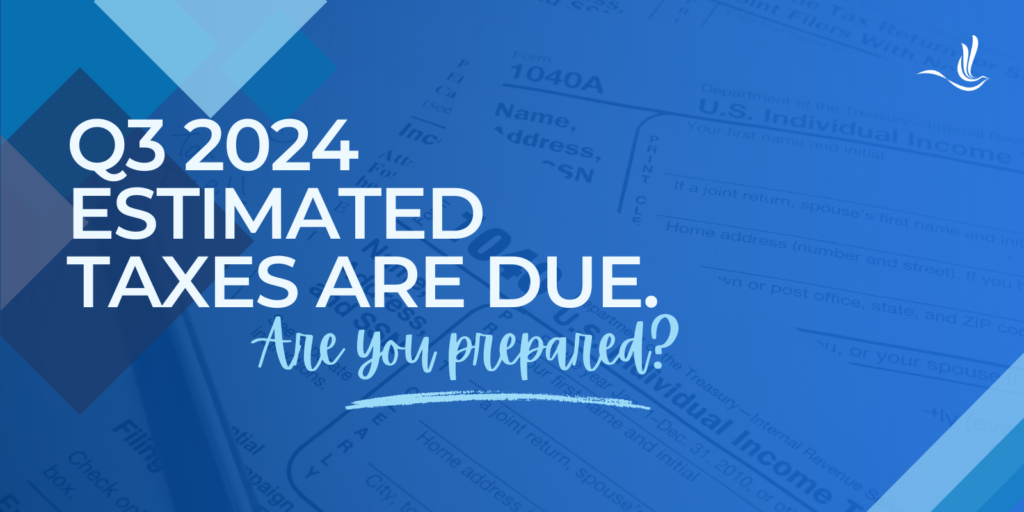
As the third quarter of 2024 comes to a close, taxpayers must remember a crucial deadline: Q3 estimated taxes are due. Whether you’re self-employed, an investor, or someone with substantial income not subject to withholding, making timely estimated tax payments is essential to avoid penalties and stay on the good side of the IRS. Here’s what you need to know to ensure you’re prepared for Q3 estimated tax payments.
What Are Estimated Taxes?
Estimated taxes are periodic advance payments made on income that is not subject to regular withholding. This includes income from self-employment, interest, dividends, rent, alimony, and gains from the sale of assets. If you expect to owe at least $1,000 in tax for the year after subtracting your withholding and refundable credits, you likely need to make estimated tax payments.
Estimated taxes function as a way for taxpayers to pay taxes on income that isn’t subject to automatic withholding, such as a traditional salary where taxes are deducted from each paycheck. The IRS requires these payments to ensure that taxes are collected throughout the year, rather than waiting until the annual tax filing deadline. This system helps both taxpayers and the IRS manage cash flow more effectively.
Who Needs to Pay Estimated Taxes?
Generally, you need to pay estimated taxes if:
- You are self-employed, either full-time or part-time.
- You have significant income from investments.
- You earn income from rental properties.
- You have a combination of income sources where not enough tax is withheld.
Self-employed individuals, freelancers, and independent contractors often have to pay estimated taxes because they do not have an employer withholding taxes from their paychecks. Similarly, if you receive substantial income from dividends, interest, rental income, or other sources not subject to withholding, you may need to make these payments. Additionally, retirees and others receiving distributions from IRAs or other retirement accounts might need to consider estimated taxes if these distributions do not have sufficient tax withheld.
Key Deadlines for 2024
The IRS has set four due dates for estimated tax payments in 2024:
- Q1: April 15, 2024
- Q2: June 17, 2024
- Q3: September 16, 2024
- Q4: January 15, 2025
It’s important to note that while the IRS provides these general deadlines, specific circumstances might warrant adjustments, such as holiday schedules or weekends pushing the due date to the next business day. Since the typical deadline for Q3 would be September 15th, which falls on a weekend this year, the deadline moves to the next business day, September 16th. These deadlines are crucial, as missing them can result in penalties and interest.
How to Calculate Your Estimated Taxes
To calculate your estimated taxes, use IRS Form 1040-ES, which provides worksheets and instructions to guide you through the process. Here’s a simplified approach:
- Estimate Your Total Income: Consider all sources of income expected for the year.
- Subtract Deductions and Exemptions: Account for standard or itemized deductions and personal exemptions.
- Determine Taxable Income: Subtract deductions from your total income to get your taxable income.
- Calculate Tax: Apply the appropriate tax rates to your taxable income.
- Subtract Credits and Withholding: Deduct any tax credits and tax already withheld.
- Divide the Remaining Tax: Split this amount by four to get your quarterly estimated tax payment.
How to Make Your Payment
The IRS offers multiple payment options to accommodate different preferences and ensure timely payments. Online payments through IRS Direct Pay and EFTPS are generally the fastest and most secure. They allow you to pay directly from your bank account or by using a credit or debit card. Mailing a check or money order, along with a Form 1040-ES voucher is another option. However, it’s slower and subject to potential postal delays. For those who prefer hands-off management, many tax professionals provide services to make estimated tax payments on your behalf. This can help ensure accuracy and timeliness.
Penalties for Underpayment
Underpayment penalties can add a significant financial burden, making it crucial to pay the correct amount of estimated taxes. The IRS provides safe harbor rules to help taxpayers avoid these penalties. If you pay at least 90% of your current year’s tax liability or 100% of the previous year’s liability (110% if your adjusted gross income is over $150,000), you generally will not face penalties. These thresholds are designed to provide flexibility and protect taxpayers from penalties due to minor underpayments.
Tax Help for Those Who Make Quarterly Estimated Tax Payments
With the Q3 2024 estimated tax payment deadline approaching on September 16th, now is the time to ensure you’re prepared. Understanding your tax obligations, accurately estimating your payments, and using the appropriate payment methods can help you stay on track. Proactive management and professional advice can help keep your financial affairs in order. Optima Tax Relief is the nation’s leading tax resolution firm with over $3 billion in resolved tax liabilities.
If You Need Tax Help, Contact Us Today for a Free Consultation